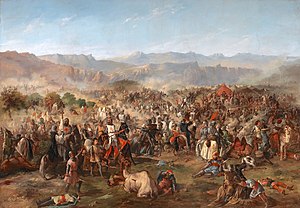Creeperian Crusade
Jump to navigation
Jump to search
This article is incomplete because it is pending further input from participants, or it is a work-in-progress by one author. Please comment on this article's talk page to share your input, comments and questions. Note: To contribute to this article, you may need to seek help from the author(s) of this page. |
| Creeperian Crusade | |||||||
|---|---|---|---|---|---|---|---|
| Part of the Creeperian-Deltinian Wars | |||||||
 The Battle of Alsakhra of November 4, 1281. | |||||||
| |||||||
| Belligerents | |||||||
| Catholics | Muslims | ||||||
|
|
| ||||||
|
|
| ||||||
| Commanders and leaders | |||||||
|
|
| ||||||
| Strength | |||||||
|
Creeperans:
Castillianans:
Papacy:
|
Deltinians:
Abdaners:
Helamans:
Jakizians:
| ||||||
| Casualties and losses | |||||||
|
Deltinians:
Abdaners:
Helamans:
Jakizians:
|
Deltinians:
Abdaners:
Helamans:
Jakizians:
| ||||||
The Creeperian Crusade (1231–1345) was the period in the history of the Southern Landmass of about 115 years between the establishment of Creeperopolis in 1231 and the fall of the Alssahil to the expanding Creeperian kingdom in 1492. The collapse of the Caliphate of Deltino and its successors would allow Creeperopolis to become the dominant nation on the landmass.
The Crusade was called for by King Alfonso I in 1231 and was approved of by Pope Gregorio IX.





